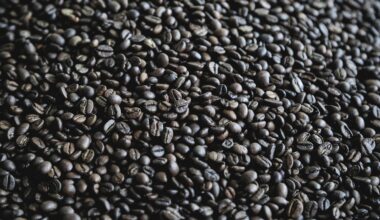Nutrition Tips from CrossFit Event Participants
Nutrition plays a vital role in the performance of CrossFit athletes. During recent events, participants shared their personal strategies, emphasizing the importance of balanced meals. Each athlete focuses on meals that prioritize protein for muscle recovery. Common strategies include preparing meals in advance and keeping snacks on hand during competitions. Many athletes recommend a diet rich in vegetables and healthy fats, which aids energy levels throughout intense workouts. Whole foods are preferred over processed options; this helps in maintaining constant energy and focus. Hydration often comes up in conversations, with water being essential before, during, and after workouts. Participants stress the need for electrolytes, particularly in hot competition settings. Smoothies and protein shakes are popular choices for quick nutrient absorption. Coaches frequently guide athletes on proper nutrition for their specific needs, ensuring they understand their body requirements. Learning from one’s body response to food can significantly improve overall performance. Keeping a food journal has been helpful for many, as it allows tracking food and performance connections. Listening to body signals results in a more tailored approach to nutrition as well.
Aside from protein and hydration, many athletes at CrossFit events discussed pre-event meals. Typically, participants consume carb-rich meals before contests to enhance performance. Breakfast becomes critical, and most prefer oatmeal or whole-grain toast topped with nut butter. The timing of meals also matters; participants often eat two to three hours before competing to allow digestion. Proximity to meal times varies for individuals, with some preferring lighter snacks close to their event. The concept of ‘eating for performance’ extends beyond competition days. A consistent meal plan is crucial for athletes seeking to maintain energy levels regularly. Consuming sufficient calories helps maintain muscle mass and supporting fatigue resistance. Athletes often mention the role of recovery meals, which typically include a balance of carbs and proteins easily digestible after workouts. Smoothies or recovery bars offer convenience, ensuring elite athletes restore their energy swiftly. Many opt for homemade options to reduce preservatives and additives. Collaborating with nutritionists is another common strategy among competitors. Developing personal plans increases effectiveness, aligning dietary habits with all training goals. A thoughtful approach to nutrition can well distinguish successful athletes from their counterparts.
Individual Dietary Approaches
Every athlete has unique dietary preferences shaped by experience and individual metabolism. Some competitors strongly follow specific dietary trends, such as paleo or ketogenic diets. The paleo diet focuses on lean meats, fish, fruits, vegetables, and excludes grains and legumes. Meanwhile, the ketogenic diet emphasizes high-fat, adequate-protein, and very low-carbohydrate intake. Participants often share their diverse experiences while experimenting to find what works best. It’s common for athletes to adapt diets seasonally or based on personal body responses. Intuitive eating allows flexibility, letting participants balance indulgence with discipline. The significance lies in how foods influence energy levels; fine-tuning intake can yield impressive changes in performance. This is particularly essential for ranging endurance events. Monitoring body composition and performance metrics is beneficial. Some opt for meal prepping to ensure access to nutritious options, aligning with parametric goals. Issue awareness regarding allergies or dietary sensitivities is critical. Coaches often advise athletes to remain aware of food reactions, suggesting alternatives or substitutions when necessary. Personal experiences vary, yet sharing knowledge regarding optimal nutrition remains essential among competitors.
Nutrition education during events also emerged as a beneficial approach for competitors. Many events now include workshops on nutrition, focusing on science-backed strategies. Learning about macronutrients and meal timing often attracts athletes. Participants appreciate accessible information aimed at improving performance and recovery through nutrition. Building a foundation of knowledge offers athletes confidence in their dietary decisions. Guest speakers, often elite athletes or nutritionists, share their expertise on fueling workouts efficiently. Tips on the significance of timing meals with training sessions are frequently highlighted. This guidance helps athletes plot out their entire day, balancing work, training, and nutrition. Many participants stress the importance of community, expressing how sharing stories and experiences strengthens their understanding. Incorporating diverse perspectives enhances the learning process, uniting a fitness-focused group. Recipes but also practical advice on grocery shopping and meal prepping are popular discussion topics. Having easy access to credible information helps alleviate confusion regarding dietary trends. Integrating such knowledge encourages athletes to take charge of their nutrition while contributing to well-rounded performance at a competitive level.
Supplementation Considerations
CrossFit athletes often discuss the role of supplements in achieving nutritional goals, determining which ones are essential. Popular supplements include protein powders, branched-chain amino acids (BCAAs), and multivitamins. Many participants emphasize the need for proper research before incorporating any supplements into their routines. Understanding ingredients and how they influence athletic performance tends to guide choices. Protein supplementation often arises from convenience, especially during busy training schedules. BCAAs are favored for muscle recovery, providing essential amino acids for athletes post-workout. Multivitamins serve as a safety net for ensuring daily nutrient intake levels are met, covering any dietary gaps. Participants also mention that consulting with professionals helps customize supplementation to individual needs. Awareness about potential side effects fosters safety among athletes opting for supplements. Discussions about timing often arise; for example, consuming protein shakes post-workout is popular. Timing affects nutrient absorption and should not be taken lightly. That narrative brings forth the importance of whole foods over reliance on supplements. While supplementation can fill gaps, a foundation of nutritious, whole foods remains paramount for optimal energy levels and performance.
Networking among CrossFit athletes often extends into shared dining experiences, enhancing camaraderie. Participants frequently gather for meals, aiding both socializing and nutritional strategy. Group meals allow for experimentation with recipes while supporting dietary choices within the community. Coordinated potlucks at events demonstrate adaptability, including tailored meals meeting various dietary preferences. Sharing wholesome meals encourages discipline and accountability for maintaining nutrition goals. Participants often circulate their favorite recipes, offering insight on meal planning to fellow athletes. Engaging in discussions about flavors and varieties enhances appreciation for nutritious options. The sense of community also translates into exploring local vendors featuring healthy dining alternatives around the event venue. Supporting local businesses while enjoying nutritious meals creates a symbiotic relationship. Additionally, many share meal-prepping ideas, guiding fellow athletes toward more manageable dietary habits. It’s not uncommon for athletes to collaborate for joint grocery shopping, allowing bulk purchases. Exploring seasonal produce keeps costs lower and diversifies meal plans. Such connections formed through shared values paid dividends, building long-lasting friendships beyond competitive environments. The practice fosters well-being, strengthening both athletes’ bodies and relationships through food.
Final Thoughts on Nutrition
Overall, nutrition remains a crucial aspect for athletes competing in CrossFit events. Understanding individual nutritional needs contributes significantly to performance. As athletes develop their unique approaches to eating, sharing experiences leads to productive outcomes. The continuous dialogue among participants serves as a resource, expanding collective knowledge on best practices. Emphasizing balance between joy and discipline, many emphasize using food as fuel while enjoying the process. Trends will continually evolve, but the principles of whole foods provide a steady foundation. Listening to one’s body and adjusting accordingly creates a successful athlete. Building on knowledge, athletes refine personal strategies, encouraging fellow competitors to discover their paths. Organizations and nutrition workshops at events enhance availability of information for growth. Emerging athletes should embrace the educational opportunities, fostering skills that last throughout their careers. Building a community focused on nourishment offers support for even the toughest challenges. As practices evolve in nutrition, fostering engagement leads to remarkable transformations, both personally and in competition outcomes. Staying proactive about nutrition empowers athletes to reach their full potential in the dynamic world of CrossFit.


